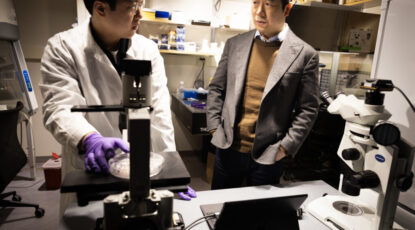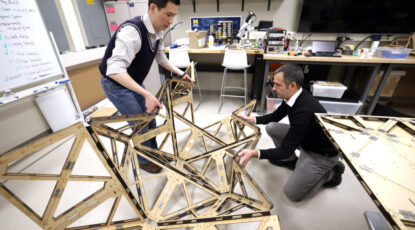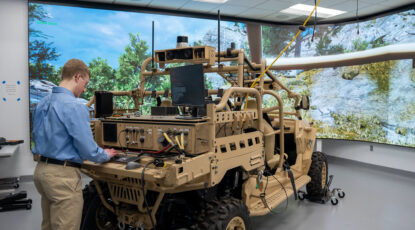Science and Technology
-
Human stem cells coaxed to mimic the very early central nervous system
The first stem cell culture method that produces a full model of the early stages of the human central nervous system has been developed by a team of engineers and biologists at U-M, the Weizmann Institute of Science, and the University of Pennsylvania. The model, which resembles all three sections of the embryonic brain and spinal cord, could shed light on developmental brain diseases.
-
Bridge in a box: Unlocking origami’s power to produce load-bearing structures
For the first time, load-bearing structures like bridges and shelters can be made with origami modules — versatile components that can fold compactly and adapt into different shapes. It’s an advance that could enable communities to quickly rebuild facilities and systems damaged or destroyed during natural disasters, or allow for construction in places that were previously considered impractical, including outer space.
-
Futuristic technology reveals secrets in ancient Vesuvius Scrolls
When Italy’s Mount Vesuvius erupted in AD 79, it buried the palatial villa of Lucius Calpurnius Piso Caesoninus, Julius Caesar’s father-in-law. These black and brittle papyri may look like charred croissants, but U-M classicist Richard Janko believes they contain lost masterpieces of literature, history, and philosophy.
-
XR and U-M: Extended reality stage expands global education
Michigan explores the academic outer limits, introducing extended and virtual reality to the classroom. Its XR studio opens a new chapter on scalable, personalized, and immersive learning technologies. Oh, the places you’ll go!
-
Off-road autonomy: U-M’s Automotive Research Center funded with $100 million through 2028
The U.S. Army has extended its long-running relationship with the U-M Automotive Research Center, reaching a new five-year agreement of up to $100 million to boost work on autonomous vehicle technologies. As automakers explore self-driving cars, the Army-funded center will figure out how to take the tech off-road.
-
These bubbles kill cancer
“Histotripsy” is a technique created by U-M engineers and doctors that harnesses soundwaves to attack cancer. It comes with the promise of few, if any side effects, a quick treatment time and, for patient Carrie Kumpel, the hope that it would completely destroy three spots that had formed on her liver.
-
Clinicians could be fooled by biased AI, despite explanations
A U-M study shows accurate AI models improved diagnostic decisions, but biased models led to serious declines. Researchers and policymakers are taking steps to ensure AI models are safe, secure, and trustworthy — and that their use would lead to improved outcomes.
-
A new generation of scientists
Kate Biberdorf, BS ’08, may be a chemistry professor at the University of Texas at Austin but aspiring scientists and fans know her as’ Kate the Chemist,’ an entertainer and bestselling author. She created the persona as a way of reaching new audiences and inspiring young minds to pursue STEM fields.
-
Neuroscientist Huda Akil wins National Medal of Science
The U-M neuroscientist is the eighth faculty member to receive the nation’s highest scientific honor. Her work contributes to the understanding of depression, anxiety, and addiction by delving into the genes, proteins, and cells that help govern human emotions and moods, and responses to pleasure and pain.










